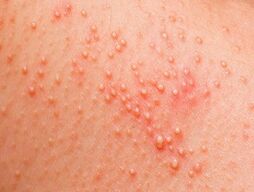Parasites are disease-causing organisms that can inhabit the human body, animals and even some plants. There are many types of organisms in the world that invade the host's body, eat its useful substances, actively multiply and leave waste in the body, leading to the development of diseases.
Worms are most commonly found in humans. These are worms of varying length and size, they mainly live in the intestines of vertebrates. But some types of helminths can travel around the body, invading muscles, liver, heart, joints, lungs, and even the brain.
The worms harm the host's body, so everyone should know how to determine the presence of the parasite in the body. But many people don't want to go to the hospital, waste time and get tested for helminths for unknown reasons.
In this case, a person can detect whether there are parasites in the body by paying attention to an important criterion such as the characteristic symptoms that develop with a certain type of helminthiasis. . What if they are not there? This is not happening!
However, in the early stages of helminth infestation, vital signs of activity of foreign microorganisms are either poorly expressed or completely absent. The clinical picture becomes intense and pronounced only when the helminths are actively developing, since their larvae cannot parasitize in humans.
How to determine the presence of worms in the body without medical research?

Different parasites cause specific symptoms on the host. If they are promptly identified and correctly decoded, this will help identify the infection even at an early stage.
Hence, the possibility of misdiagnosis is minimized, which will allow for correct and effective worming by using folk or medical antiparasitic drugs.
So to identify the parasite in the human body, you need to pay attention to the symptoms:
- You grind your teeth at night.
- Atopic skin rash - acne, acne, urticaria, herpes on the lips, eczema, red spots, papillomas, neurodermatitis, psoriasis and more.
- Development of upper respiratory tract diseases (bronchitis, pneumonia, runny nose), typically roundworm and strongyloidiasis.
- Flatulence and diarrhea are caused by worms that prevent the secretion of bile and pancreatic juice.
- Constipation occurs when worms form a ball that blocks the intestinal path.
- Joint and muscle discomfort caused by parasite movement.
- Severe discomfort due to painful symptoms.
- A persistent dry cough cannot be treated with conventional antitussives.
Also observed an increase in body temperature to values below the threshold. Causes of this condition may lie in allergies, blood poisoning, nerve disorders, problems in the functioning of internal organs and the brain, and anemia syndrome.

In addition, worms that live in the person greatly reduce the person's immunity, so the patient often catches colds. In addition, patients suffer from prolonged depression due to body intoxication.
The characteristic symptoms of helminthiasis are nausea and vomiting, caused by the release of toxic substances. Furthermore, certain types of worms that can live in the human body, produce specific hormones that affect the gut microflora, which causes diarrhea.
However, in some cases such symptoms are not attributed to helminth infections, as they are similar to signs of food poisoning. Although this can become a serious problem, because the later treatment is started, the longer the host's organs and systems have to penetrate.
So in order to detect helminthiasis at home, you should have a test done. To achieve this you need to answer the following questions:
- Is there anal itching at night?
- Are the lymph nodes swollen?
- Is there a skin rash?
- How often does insomnia happen?
- Do you experience vomiting and nausea?
- Are there muscle pains and muscle aches?
- How often does bloating develop?
- How often does a bitter taste in the mouth taste?
If a person gives seven definite answers to these questions, there is a high chance that his body is infected with worms.
How do I determine the type of helminth by symptoms?

At home, you can determine what worms live in the human body. But this can only be done if the parasite has reached an active stage of development.
Toxocariasis and Toxocariasis are characterized by the strongest neurological signs in young patients. Aggressive and neurotic behavior occurs due to the effects of toxic substances on the nervous system. For similar reasons, an infected person develops migraine headaches and dizziness.
As a rule, trichinosis is accompanied by joint and muscle pain, as well as swelling of the face and eyelids. This is due to the peculiarities of the life Trichinella lives in the skeletal muscles. You can become infected with this parasite if you eat wild animal meat or poorly heat-treated pork.
Giardiasis affects the functioning of the liver and kidneys and causes all types of allergic reactions. Furthermore, some people, when their bodies are damaged by lamblia, develop arthritis, develop from intoxication. In addition, in an invasive patient, immunity is weakened, on the basis of this, the following diseases develop:
- sinusitis;
- stomatitis;
- bacterial vaginosis and more.

A characteristic feature of pinworm disease is itching in the anal canal. Furthermore, most infected people experience gastrointestinal problems.
Anemia syndrome is characteristic of schistosomiasis. There are also manifestations of dysbacteriosis (pathogenic microorganisms inhibit the favorable microbiota).
With bronchiectasis, fasciolosis and eye stone disease, the gallbladder is affected and the colon syndrome develops. Furthermore, against the process of these helminths, the liver and spleen increase.
Strongyloidiasis has many symptoms. So, with its progression, there are problems in the digestive tract, digestive disorders and allergic manifestations.
How do I determine if there are helminth eggs without lab conditions? When the worms are in the reproductive stage, you can easily detect their presence in the body. To do this, you need to analyze the parasite's eggs.
With the development of opisthorchiasis, you can do research yourself at home. For this purpose, the tape or tape must be applied to the skin in the anal area.
It's best to do it right after waking up in the morning. If a person has cloudy acne, their eggs are identified on the sticky surface of the dressing.
Laboratory methods for detecting parasites
If a patient has more than three symptoms characteristic of helminthiasis, then he should contact a medical facility to determine the presence of the parasite at home has been confirmed in the laboratory. .

The first step in the case of a suspected worm entry is to study the stool. This allows you to identify the eggs of tapeworms, nematodes and tapeworms. However, to confirm the correct diagnosis, tests must be performed three times every few days.
To determine parasitic intestinal disease, curettage is conducted near the anus. In addition, one of the most accurate and convenient tests for the patient is the ELISA, which allows you to detect in the blood antibodies the body produces when pathogenic microorganisms are parasitic.
Occasionally conduct a diagnosis of biological origin, study the frequency of parasites. This method is very informative, as it determines the state of the body in general. In addition, in addition to parasites, such a study allows you to find an immune state that weakens it, to identify other diseases, as well as pathogenic fungi, bacteria, and viruses.






































